Strategic Studies
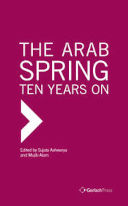
The Arab Spring: Ten Years On
Sujata Ashwarya, Mujib Alam (eds.) – 2022
It has been a decade since people across the Arab world rose up in revolt against their governments in 2010/11, demanding political empowerment, social reform and economic improvement. Pro-democracy protests, as they were called in common parlance, which spread rapidly through the mobilisation of social media calls, ended up overthrowing long-standing authoritarian regimes in Tunisia, Egypt, Yemen and Libya. That gave rise to hope for a more representative future, as well as economic reforms, after decades of mismanagemen...
more »
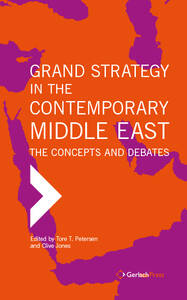
Grand Strategy in the Contemporary Middle East
The Concepts and Debates
Tore T. Petersen, Clive Jones (eds.) – 2022
This unique volume explores the role that Grand Strategy has played in the shaping of the Middle East and why, conceptually, its core principles still have traction in explaining the shifting alliances and dispensation of power across the region. When so much of the spatial as well as the geo-political boundaries of the Middle East are in flux, it is now time to revisit the very ideas that inform Grand Strategy that once again, are enjoying a wider intellectual renaissance in world affairs. Through a longitudinal met...
more »
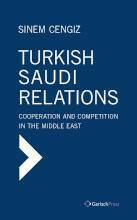
Turkish-Saudi Relations: Cooperation and Competition in the Middle East
Sinem Cengiz – 2020
Are the Middle East’s two heavyweights, Turkey and Saudi Arabia, friends or foes? What are the main drivers behind their rivalry or cooperation? The nature of their relationship has region-wide repercussions, affecting the calculations of both regional and global actors. This book is the first to offer a comprehensive and nuanced examination of the main drivers in the complex relationship between Turkey and Saudi Arabia, focusing on the role of domestic, regional and international dynamics. Three decades are examined: the ...
more »
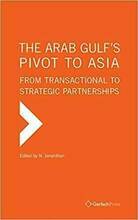
The Arab Gulf’s Pivot to Asia:
From Transactional to Strategic Partnerships
N. Janardhan (ed.) – 2020
Over the last two decades the relations between the countries of the Gulf and Asia have expanded beyond the economic domain to include political and even security arrangements. While oil and non-oil trade are still the fulcrum of their association, ‘strategic’ partnerships are fast becoming the norm. The contributors of this book argue that, along with economic diversification, the Gulf countries have also diversified their foreign policies, especially with China, India, Japan and South Korea, among others. Together with Ru...
more »
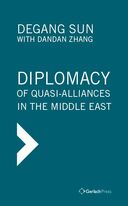
Diplomacy of Quasi-Alliances in the Middle East
with a foreword by Tim Niblock
Degang Sun, Dandan Zhang – 2020
Quasi-alliance refers to the ideation, mechanism and behavior of policy-makers to carry out security cooperation through informal political and security arrangements. As a “gray zone” between alliance and neutrality, quasi-alliance is a hidden national security statecraft. Based on declassified archives and secondary sources, this book probes the theory and practice of quasi-alliances in the Middle East. Four cases are chosen to test the hypotheses of quasi-alliance: - the Anglo-French-Israeli quasi-alliance during the Suez...
more »
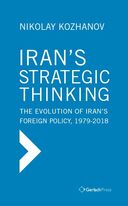
Iran’s Strategic Thinking:
The Evolution of Iran’s Foreign Policy, 1979-2018
Nikolay Kozhanov – 2018
What are the ideological motives behind Iran’s foreign policy? This new study examines Tehran’s twin desires to protect national interests and to project real power. Factors determining Iran’s foreign policy include: - Potential economic leader of the Middle East region - Key player in the oil and gas market - Centre of resistance against global Western domination - US and Israel policy - Syria as the bridge to Lebanon and Palestine There is a strong focus on primary sources, as well as interviews with EU, Russian and Middle...
more »
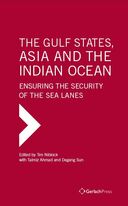
The Gulf States, Asia and the Indian Ocean: Ensuring the Security of the Sea Lanes
Tim Niblock, Talmiz Ahmad, Degang Sun (eds.) – 2018
Among the many strategic and economic issues facing the Gulf in the coming years, those relating to the Indian Ocean are set to be among the most challenging. In the re-ordering of global economic and political power which is currently underway, the Indian Ocean constitutes a key arena for regional and global competition and rivalry. With the leading Asian powers playing a more pro-active role in the region, sometimes with conflicting ambitions, and the United States intent on maintaining its established maritime hegemony th...
more »
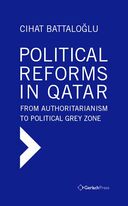
Political Reforms in Qatar: From Authoritarianism to Political Grey Zone
Cihat Battaloglu – 2018
In the past decade, Qatar has emerged as one of the world’s most proactive mediators in the international arena. It has also experienced a number of domestic changes to its economic infrastructure, welfare system and political system, along with material improvement in its citizens’ standard of living. Nonetheless, despite such radical and rapid advances, political reform in Qatar has proved to be relatively tentative. This book examines political reforms in Qatar from an analytical, normative and ideological perspective. It...
more »
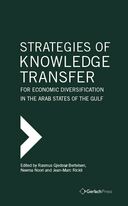
Strategies of Knowledge Transfer for Economic Diversification in the Arab States of the Gulf
Rasmus Gjedssø Bertelsen, Neema Noori, Jean-Marc Rickli (eds.) – 2017
Diversification is the principal economic objective for the Gulf States. The steep and sustained fall in oil prices over the last few years has added to the collective urgency to seek new sources of revenue. As such, the overriding theme of regional economic summits in recent years has focused on the question, “how do we transition to a knowledge-based economy?” This is the central question taken up by the contributors to this volume. A growing body of literature has begun to address how state policy in conjunction with univ...
more »
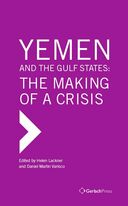
Yemen and the Gulf States: The Making of a Crisis
Helen Lackner, Daniel Martin Varisco (eds.) – 2017
Yemen is the only state on the Arabian Peninsula that is not a member of the GCC (Gulf Cooperation Council). It is also the only local state not ruled by a royal family. Relations between Yemen and the GCC states go back for centuries with some tribes in Saudi Arabia, Kuwait, Qatar, the United Arab Emirates and Oman tracing genealogy back to ancient Yemen. In this timely volume six scholars analyze Yemen’s relations with Saudi Arabia, the United Arab Emirates, Oman and Iran with a focus on recent developments, including the ...
more »
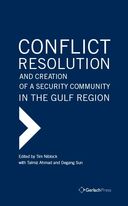
Conflict Resolution and Creation of a Security Community in the Gulf Region
Tim Niblock, Talmiz Ahmad, Degang Sun (eds.) – 2017
The bitter confrontation between Saudi Arabia and Iran is not only stoking conflicts in Syria, Iraq and Yemen, but now threatens the stability, security and well-being of the whole Gulf region. All the major global powers have significant interests in this area, and the pursuit of these interests adds further layers of division and conflict. This book goes to the heart of this issue, examining the critical modalities whereby the "Gulf Cold War" can be brought to an end. What is needed, the contributors argue, is th...
more »
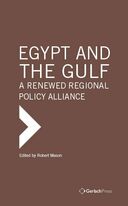
Egypt and the Gulf: A Renewed Regional Policy Alliance
Robert Mason (ed.) – 2017
Egypt continues to be cultural and political beacon in the Middle East. Its control of the Suez Canal, cold peace with Israel, concern about Gaza, mediation and interest in the Israel-Palestine conflict, and the marginalization of the Muslim Brotherhood are all points of significance. There is a close, and expanding, defence and security relationship between Egypt and the GCC states, most evident in the inclusion of Egypt in Saudi Arabia's new Sunni counter-terrorism alliance. The authors of this book contextualise hist...
more »
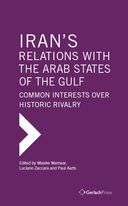
Iran's Relations with the Arab States of the Gulf:
Common Interests over Historic Rivalry
Maaike Warnaar, Luciano Zaccara, Paul Aarts (eds.) – 2016
GCC-Iran relations are at the heart of important political dynamics in the Middle East today. This is not limited to the ongoing disputes in the Gulf, one of the most important strategic locations globally. Iran and the GCC states also find themselves on opposing sides.in the Syrian and to some extent the Iraqi conflicts. This volume traces the origins of the troubled relations between Iran and the majority of the GCC monarchies. It discusses not only geostrategic rivalries, but also matters of identity which have been of in...
more »
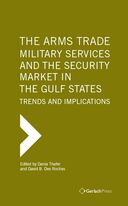
The Arms Trade, Military Services and the Security Market in the Gulf States: Trends and Implications
David B. Des Roches, Dania Thafer (eds.) – 2016
The Gulf is in the first rank of potential global flashpoints. It is the largest market for weapons imports in the world, and is considered to be a vital interest of all the great powers. Iran is viewed as an expansionist threat by the Arab states of the Gulf, who have built considerable militaries in a historically short timeframe. Security in the Gulf, however, is a complicated matter. The Arab states of the Gulf have pursued different defense policies as well as different ways of building up their forces. In some instance...
more »
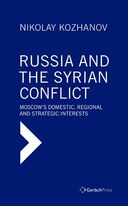
Russia and the Syrian Conflict:
Moscow’s Domestic, Regional and Strategic Interests
Nikolay Kozhanov – 2016
This book is the first to offer a comprehensive survey of Moscow’s foreign policy interests in Syria. The author considers the Kremlin’s diplomacy on Syria within the broader system of Russian foreign policy in the Middle East; he analyses the influence of Russian domestic dimensions on Moscow’s approaches to the subject; and he considers how Moscow’s priorities in Syria have evolved during the last five years and what factors influenced this evolution. Key factors considered include: - Russian presence in the Middle East be...
more »

The United States and the Gulf:
Shifting Pressures, Strategies and Alignments
Steven W. Hook, Tim Niblock (eds.) – 2015
The Gulf region’s relations with the outside world are changing radically. The Gulf’s major trading partners are now no longer predominantly Western. China, in particular, now has a significant stake and highly critical interests in the region. The United States still dominates the security field, yet its Gulf allies have come to doubt the strength of US commitment. Meanwhile the Arab monarchies of the Gulf are struggling to cope with multiple divisions, problems and threats: the radical forces of change unleashed by the Ara...
more »
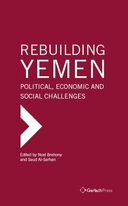
Rebuilding Yemen:
Political, Economic and Social Challenges
Noel Brehony, Saud Al-Sarhan (eds.) – 2015
As Yemenis start planning the reconstruction and rebuilding of their country after recent turmoil they face huge challenges in every major sphere. This book discusses the political and economic background and analyses the most important issues: - the option of improved governance through a federal government - addressing the powerful and patronage networks of the previous regime - investing in Yemen’s human and natural resources to compensate for falling revenues from oil and gas - maintaining rural life through reduced depe...
more »
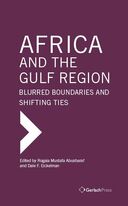
Africa and the Gulf Region:
Blurred Boundaries and Shifting Ties
Rogaia Mustafa Abusharaf, Dale F. Eickelman (eds.) – 2015
The ties that bind Africa and the Gulf region have deep historical roots that influence both what Braudel called the longue durée and the short-term events of current policy shifts, market-based economic fluctuations, and global and local political vicissitudes. This book, a collaboration of historians, political scientists, development planners, and a biomedical engineer, explores Arabian-African relationships in their many overlapping dimensions. Thus histories constructed from the “bottom up” – records of the everyday act...
more »
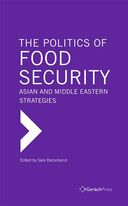
The Politics of Food Security: Asian and Middle Eastern Strategies
Sara Bazoobandi (ed.) – 2014
The international food system is increasingly at risk. Increasing demand, limited and diminishing resources and rising volatility are putting new pressures on the agriculture sector globally. One of the growing critical threats to global stability and security is the inadequacy of food resources. This threat,exacerba-ted by global population growth, is illustrated by shifts in consumption patterns toward protein-rich diets and the growth of multinational food retail, which bring about a greater reliance on food imports. This...
more »
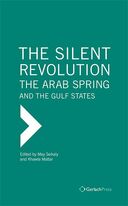
The Silent Revolution: The Arab Spring and the Gulf States
May Seikaly, Khawla Mattar (eds.) – 2014
How immune is the Gulf region to the changes that have engulfed the Arab world since 2011? This volume responds to this question by examining the impact of the Arab Spring on Gulf regimes and societies and contributing to debates on political participation and citizenship; sectarianism, gender and identity formation; as well as the role of the media in exposing the paradoxes of the Gulf system and its relationship to international political actors....
more »
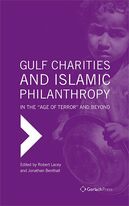
Gulf Charities and Islamic Philanthropy in the "Age of Terror" and Beyond
Robert Lacey, Jonathan Benthall (eds.) – 2014
Gulf Charities and Islamic Philanthropy in the "Age of Terror" and Beyond is the first book to be published on the charities of Saudi Arabia and the Arabian Gulf, covering their work both domestic and international. From a diversity of viewpoints, the book addresses: The historical roots of Islamic philanthropy in religious traditions and geopolitical movements The interactions of the Gulf charities with "Western" relief and development institutions - now under pressure owing to budgetary constraints Num...
more »

A New Gulf Security Architecture:
Prospects and Challenges for an Asian Role
Ranjit Gupta, Abubaker Bagader, Talmiz Ahmad, N. Janardhan (eds.) – 2014
This book explores how growing economic ties between Asian countries and the Gulf Cooperation Council (GCC) could impact their future relationship. It postulates that the stage is now set for strategic partnerships and highlights how some Asian countries have been explicit about showcasing their power and influence in the Gulf region. While exploring an alternative and broad-based security architecture, it identifies the challenges that any probable Asian cooperative approach could face as the countries of the Arabian Gulf s...
more »

Political Economy of Energy Reform:
The Clean Energy-Fossil Fuel Balance in the Gulf States
Giacomo Luciani, Rabia Ferroukhi (eds.) – 2014
Climate change requires coordinated global responses. All nations, including major Gulf Arab oil producers, should implement policies to contain greenhouse gas (GHG) emissions. Yet all realistic scenarios point to the continuing global need for fossil fuels. The countries of the Gulf Cooperation Council (GCC) thus face a dilemma between continuing development and use of their fossil fuel endowments and increasing reliance on low carbon sources, such as nuclear, solar or wind. This book explores various facets of the dilemma....
more »



